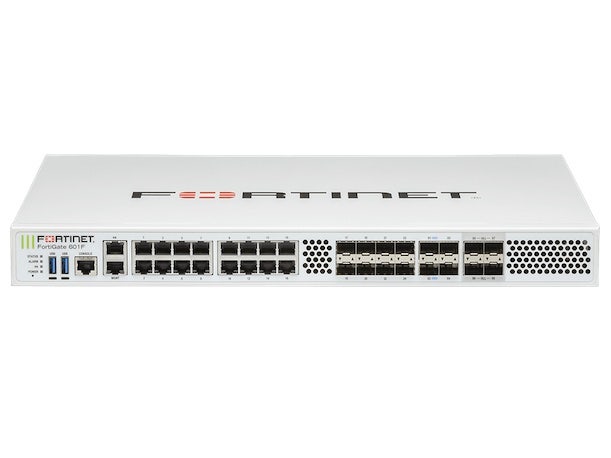Fortinet Stock Downgraded After Weakest Firewall Results Since IPO
As the network security vendor transitions to a focus on fast-growing areas such as SASE, Wall Street analysts are airing concerns.

Fortinet was downgraded by at least six equity analysts Friday after the network security vendor reported the first year-over-year decline in firewall sales since it went public in 2009, along with a weaker outlook for the current quarter.
MarketWatch showed downgrades on Fortinet’s stock (FTNT) from Wall Street analysts at JP Morgan, Cantor Fitzgerald, Evercore ISI, Oppenheimer, Stifel and William Blair.
[Related: Fortinet Makes Cuts To Sales, Channel, Business Development Groups]
CRN has reached out to Fortinet for comment.
Fortinet’s stock price was down about 16 percent as of this writing Friday morning, to $48.25, from its closing price of $57.59 a share on Thursday, prior to the company’s quarterly financial report.
The Fortinet results for the third quarter, ended Sept. 30, saw a gain in total revenue from a year ago, but the picture was clouded by a drop in firewall sales. Product revenue declined 0.6 percent, year-over-year, to $465.9 million.
Analysts at Stifel remain convinced that Fortinet has “best-in-class capabilities,” according to a note to investors disclosed by Seeking Alpha. However, Stifel analysts are also “concerned” that the slowdown in firewall sales is “likely a headwind to broader multi-product sales,” since firewalls are considered the “’gateway’ to selling the broader platform.”
Amid the quarterly report Thursday, Fortinet said it will be shifting more of its focus to faster-growing areas, such as SASE (secure access service edge) and security operations tools. SASE now represents 20 percent of Fortinet’s business while SecOps tools now make up 10 percent.
However, conditions have worsened for Fortinet’s secure networking business, which accounts for the remaining 70 percent of the company’s business and includes its FortiGate next-generation firewalls. Fortinet is encountering a “slowdown in secure networking market growth,” Co-Founder and CEO Ken Xie said during the company’s quarterly call with analysts Thursday.
‘Year Of Transition’
One analyst who did not change their rating for Fortinet was Shaul Eyal, managing director for equity research at investment bank TD Cowen, though he did lower his price target for the company’s stock.
In a note to investors, Eyal pointed out that Fortinet’s quarterly appliances revenue declined year over year for the first time since its IPO 14 years ago. The company’s product revenue fell short of analyst expectations by about $20 million, he noted.
The comments from top Fortinet executives Thursday suggest “current demand trends are pointing to a significant deterioration in the network firewall market,” Eyal wrote. “Coming from a period of elevated product growth, we now expect [2024] to be a year of transition as growth for appliances normalizes.”
The company’s revenue outlook for the fourth quarter has also come in below Wall Street expectations. Fortinet is now expecting revenue of between $1.38 billion and to $1.44 billion, compared to the prior analyst consensus estimate of $1.49 billion.
“We continue to see increased deal scrutiny and longer sales cycles, which is constraining our near-term results,” Fortinet CFO Keith Jensen said during the call with analysts.
The elongated sales cycles were a main culprit in Fortinet’s prior quarterly results, which similarly prompted a plunge in the company’s stock price upon release in early August.
Fortinet’s stock price is now down about 24 percent since its closing price of $75.76 on Aug. 3, just before the company’s second-quarter results came out.
SASE Shift
During Fortinet’s call with analysts Thursday, executives sought to demonstrate that its investments in SASE and SecOps will more than compensate for the slowdown in sales of firewalls down the road. The Sunnyvale, Calif.-based company issued a separate announcement Thursday to highlight how it is “sharpening its business focus to prioritize high-growth, differentiated markets.”
The SASE market is forecast to grow 20 percent a year over the next four years, while the SecOps market is expected to grow 14 percent a year, the company said in the news release.
In Fortinet’s third quarter results, service revenue grew nearly 28 percent, year over year, to reach $868.7 million, the company reported.
Fortinet is well-positioned to capitalize on major near-term market opportunities, Jensen said during the call, through “shifting our R&D and go-to-market investments to the faster-growing SASE and SecOps markets.”
Palo Alto Networks Also Hit
While stock indices including the Nasdaq Composite and S&P 500 were up Friday morning, shares in Fortinet competitor Palo Alto Networks were down 3.3 percent to $241.98 a share. The company competes with Fortinet in the markets for firewalls, SASE and SecOps.
However, Palo Alto Networks’ stock price was not down as sharply as it was in early August after Fortinet’s prior disappointing report, when Palo Alto Networks shares fell 8 percent.
Ultimately, investor concern about Palo Alto Networks prompted by the previous Fortinet financial report turned out to be unfounded, as the company regained much of its lost market value upon reporting its own quarterly results on Aug. 18. The report revealed strong growth in several of its newer businesses including SASE and AI-powered security operations, and beat analyst expectations on earnings while coming in just shy of revenue estimates.
Palo Alto Networks was the sole vendor chosen to appear in the “leaders” quadrant for Gartner’s first-ever Magic Quadrant for Single-Vendor SASE, which was published in August. Fortinet was ranked in the “challengers” quadrant for single-vendor SASE, according to the Gartner report.